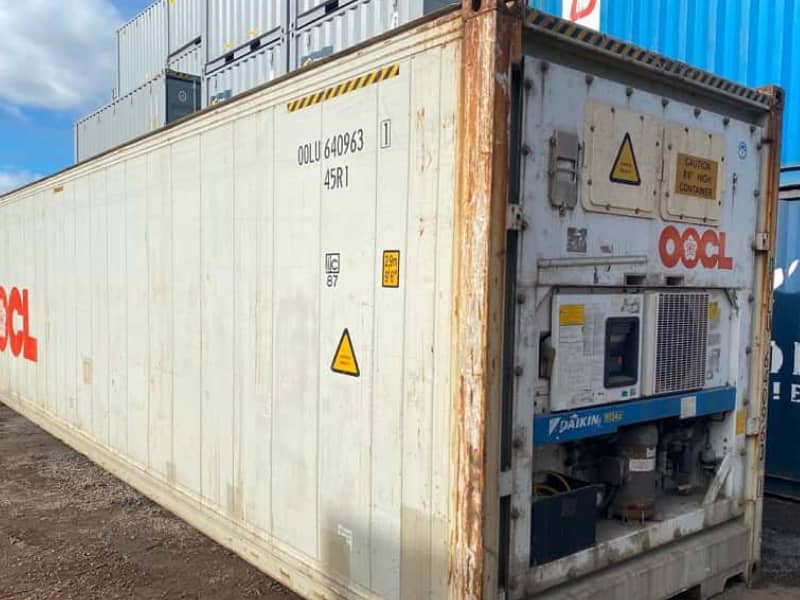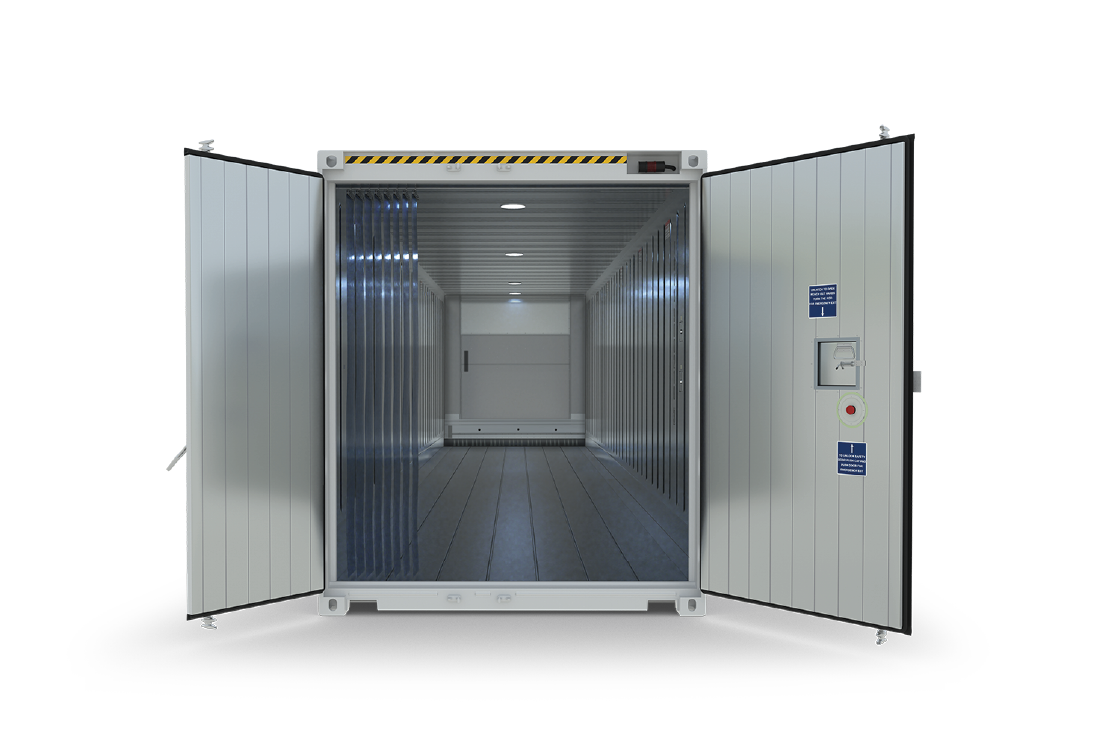Everything About Cold Store Containers: Necessary Insights for Your Storage Demands
Cold store containers play an important role in the conservation of perishable items. They are available in various kinds, including chilled and protected units, each created for particular storage space demands. Understanding the advantages and essential attributes of these containers is vital for businesses aiming to optimize their operations. As the need for reliable storage space services expands, exploring the various options offered can lead to notified choices that affect both profitability and sustainability. What aspects should one consider when choosing the appropriate container?
Types of Cold Storage Space Containers
Cold storage space containers come in different kinds, each made to meet particular temperature control requirements. Among the most typical kinds are cooled containers, which keep temperature levels in between 0 ° C to 10 ° C, making them ideal for subject to spoiling items like fruits, veggies, and milk items. An additional kind is the deep fridge freezer container, which runs at temperature levels listed below -18 ° C, perfect for lasting storage space of icy products such as meats and fish and shellfish.
Protected containers give temperature level security without energetic air conditioning, making them beneficial for temporary transport of temperature-sensitive products. Furthermore, there are portable cold store units, which provide versatility in places and are often utilized in events or seasonal procedures. Finally, blast chillers quickly lower the temperature level of hot foods, guaranteeing safety and security and top quality. Each type offers an unique objective in various industries, from food solution to drugs, stressing the value of choosing the right container for certain storage demands.

Benefits of Utilizing Freezer Solutions

Additionally, freezer options extend the life span of products, lowering waste and raising earnings for businesses. By effectively managing inventory with correct temperature control, firms can maximize their supply chains and improve operational effectiveness.
Furthermore, cold storage centers allow for adaptable storage space choices, fitting different volume demands and seasonal variations in need (used 40ft refrigerated shipping containers). This flexibility assists companies respond quickly to market adjustments
Employing chilly storage space solutions can guarantee compliance with health and safety and security policies, securing both consumers and organizations. Overall, the critical use of chilly storage boosts item administration while promoting sustainability and economic viability.
Trick Functions to Look for in Cold Store Containers
When selecting freezer containers, a number of vital features advantage cautious consideration to secure peak performance and reliability. First, temperature control abilities are necessary; containers should keep constant temperatures ideal for certain products. Insulation quality likewise plays a substantial duty, as superior insulation lowers energy usage and improves temperature level security.
Next off, simplicity of accessibility and loading is important; containers ought to use easy to use layouts for efficient handling and company. Sturdiness is one more vital element; weather-resistant materials ensure longevity and safeguard materials versus environmental elements.
Furthermore, movement functions, such as integrated wheels or lifting points, help with transport, while adjustable formats permit tailored storage solutions.
Lastly, monitoring systems, including temperature level alarm systems and remote tracking, supply real-time updates, making certain that problems remain ideal. By concentrating on these features, individuals can choose freezer containers that fulfill their operational needs efficiently.
Choosing the Right Cold Storage Container for Your Requirements
Selecting the right cold store container requires a thoughtful assessment of details needs and functional needs. Factors such as the sort of items being saved, temperature sensitivity, and volume must be focused on. Subject to spoiling food items may necessitate containers with rigid temperature level controls, while drugs might need exact problems to preserve effectiveness.
In addition, possible customers need to consider the container's size and mobility. A larger unit might be necessary for mass storage space, while smaller sized, mobile choices might be suitable for short-lived or on-site demands. Insulation quality and power performance are additionally essential, as these will certainly affect operational costs and temperature security.
Last but not least, conformity with market policies and requirements is necessary, especially in markets like food and health care. By very carefully examining these facets, users can choose a cold store container that effectively meets their distinct needs and assurances optimal storage space conditions.
Best Practices for Maintaining Cold Storage Space Conditions
Maintaining ideal freezer conditions is necessary for maintaining the high quality and safety and security of temperature-sensitive items. Frequently keeping track of temperature level and humidity degrees is crucial; making use of reputable digital thermometers and hygrometers can provide precise analyses. Appropriate insulation of cool storage containers assists decrease temperature changes and power loss.
Executing a first-in, first-out (FIFO) system ensures that older inventory is utilized prior to more recent stock, decreasing waste you could look here (used 40ft refrigerated shipping containers). In addition, maintaining an organized design within the storage room permits much better air movement and reduces the danger of cross-contamination
Regular upkeep checks on equipment, such as seals and compressors, are essential to stop malfunctions. Personnel training on finest techniques for loading and unloading products helps preserve temperature stability. Maintaining doors shut as much as feasible restrictions warm exchange, ensuring that the chilly storage atmosphere remains stable and effective in maintaining useful items.
Expense Considerations for Freezer Solutions
When assessing cold store solutions, it is important to take into consideration the initial financial investment expenses together with ongoing functional expenditures. A detailed failure of these expenses can reveal significant lasting cost savings potential for businesses. Recognizing these monetary aspects aids stakeholders make notified decisions concerning their cold store demands.

Initial Financial Investment Costs
The monetary landscape of chilly storage space containers presents different initial investment expenses that services need to take into consideration. These prices generally include the acquisition or rental cost of the containers, which can differ based on size, type, and insulation high quality. Furthermore, expenses related to retrofitting existing frameworks to suit chilly storage should be factored in, especially if specialized equipment is required. Installment expenses, including electric job and refrigeration systems, likewise contribute to the total preliminary investment. Businesses need to not ignore transportation prices for providing containers to their desired location. Ultimately, prospective customization alternatives, such as shelving or temperature surveillance systems, can additionally impact the initial monetary outlay. Mindful budgeting for these factors is crucial for effective freezer application.
Operational Expenditures Break Down
Functional expenses for freezer options encompass numerous important cost factors to consider that businesses need to browse. Trick aspects consist of energy expenses, which can be significant because of the demand to maintain low temperature levels. Upkeep expenses are likewise substantial, as regular servicing is important to guarantee devices runs efficiently and stays certified with health and wellness requirements. Furthermore, labor prices might arise from the requirement for specialized personnel to keep track of the storage space and take care of environment. Insurance coverage costs are an additional factor to consider, as firms must protect their investments against prospective losses. Any kind of possible regulative conformity expenses need to be factored in, as services might require to spend in systems that adhere to food safety and ecological policies. Understanding these costs is critical for reliable budgeting.
Long-Term Financial Savings Potential
Investing in cool storage solutions uses significant long-lasting financial savings possibility, changing initial expenditures right into financial efficiency in time. By reducing putridity and waste, businesses can boost their profit margins significantly. Advanced insulation and energy-efficient systems reduce energy expenses, which build up over the lifespan of the tools. Cool storage containers often need much less frequent upkeep compared to standard refrigeration methods, leading to reduced repair work expenses. The capability to store products for extensive periods without endangering high quality allows services to capitalize on market changes, maximizing profits. Additionally, the scalability of cold store services makes it possible for companies to adjust to changing demands without incurring too much costs. In general, these variables add to an engaging instance for cold store as an affordable financial investment technique.
Often Asked Inquiries
For How Long Can Food Be Stored in Cold Storage Containers?
The period food can be saved in cold store containers varies by type. Normally, perishable items last from days to weeks, while frozen foods can stay safe for months, relying on correct temperature level and storage conditions.
Are Freezer Containers Energy-saving?
The power performance of freezer containers varies based upon layout and insulation top quality. Modern systems typically make use of innovative modern technology to minimize power intake, eventually contributing to decreased operational prices and environmental effect in lasting use.
Can Cold Store Containers Be Personalized for Details Demands?
Freezer containers can certainly be personalized to meet details demands. Adjustments may include temperature level controls, dimension modifications, and pop over to this site additional features, allowing users to tailor services properly for various storage space demands and operational choices.
What Are the Usual Sizes of Cold Storage Containers?
Cold store containers commonly can be found in typical go to my site dimensions such as 10, 20, and 40 feet. These measurements suit numerous storage space needs, making certain versatility for companies needing temperature-controlled settings for delicate materials or perishable goods.
Do Cold Storage Space Containers Require Unique Permits for Usage?
Cold store containers frequently need unique licenses for usage, relying on neighborhood guidelines and meant applications. Authorities might mandate authorizations to ensure security criteria, environmental conformity, and proper functional methods are kept during their application.
Cold storage containers come in numerous types, each designed to fulfill specific temperature level control needs. Furthermore, cool storage centers allow for versatile storage space options, suiting various volume needs and seasonal fluctuations in demand. Picking the right cold storage container requires a thoughtful analysis of operational needs and specific requirements. The economic landscape of chilly storage space containers offers different first financial investment prices that companies need to take into consideration. Cold storage containers can indeed be customized to satisfy specific demands.